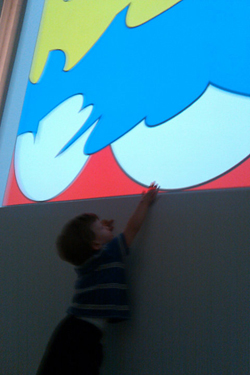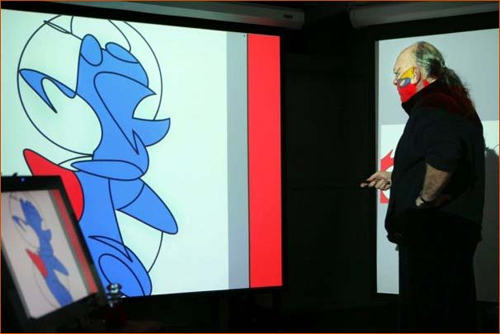| Orpheus and Linead: Solo
Exhibition at Sundaram Tagore Gallery, New York City (September 9 - October 9,
2010) — The New York City gallery premiere of Adi Da's Image-Art. Curated
by internationally acclaimed art critic and art historian, Achille
Bonito Oliva. 
Sundaram
Tagore Gallery
547 West 27th Street
New York, New York 10001 | The
catalog for this exhibition is available from The Dawn Horse Press. | |  |
Sections
on this page:  Press
Release from The Sundaram Tagore Gallery Press
Release from The Sundaram Tagore Gallery
SUNDARAM
TAGORE NEW YORK PRESENTS
ADI DA SAMRAJ’S WORK, CURATED BY ACHILLE BONITO OLIVA
New
York, July 27, 2010—Adi Da Samraj is known for his monumental works meant
to draw viewers into an ecstatic experience and connect them to a higher spiritual
truth. Since his participation in the 2007 Venice Biennale, the late American-born
artist has commanded a large international following. This exhibition, called
Orpheus and Linead, curated by the renowned Italian critic and art historian Achille
Bonito Oliva (director of the 45th Venice Biennale), comprises 11 works on aluminum.
Each image is a geometric abstraction composed of the three primary colors and
black and white. The works in the series reinterpret the Greek myth of Orpheus
and Eurydice. This is the artist’s first solo exhibition in New York and it features
several works that have never been shown publicly. Adi Da (1939-2008)
graduated from Columbia University in New York in 1961 with a BA in philosophy
and from Stanford University in 1966 with an MA in literature. His thesis was
on modernism, Gertrude Stein, and painters of the same period. He began making
art in the early 1960s, in the form of photography and calligraphic brush painting.
In the last decade of his career, he worked to move beyond the single-point perspective
that dominates the canon of Western art. By transcending single-point perspective,
which he equated with egocentricism, he sought to invite viewers into a space
devoid of ego. Curator Achille Bonito Oliva explains: “ The abstraction of Adi
Da Samraj is anti-rhetorical and aspires to restore humanity to a state of contemplation
and reflection….His abstract images look upon the world from beyond any point
of view.” Over the course of his artistic career, Adi Da embraced
technology, which he valued for the precision, aesthetic freedom, and non-painterliness
it allowed. For this body of work, Adi Da began by photographing a chair, a bicycle,
and a bird in flight. He then made digital compositions of geometric shapes inspired
by his photographs. Once completed, the first drawing served as the basis for
the next work as he sought to progressively abstract his images. Thus each subsequent
image was a further distillation of the previous one. Adi Da’s
digital drawings were informed by a complex vocabulary of forms, colors, and spiritual
concepts. He used two major visual elements in each work, which he called lineads
and geomes. Lineads are hand-drawn gestural marks and curvilinear lines; geomes
are solid geometric shapes. There is a momentum that takes place as the lineads
uncoil upon the harmoniously positioned blocks of colors or the geomes. Together
these forms unite to create a sense of dynamism and movement within the drawings. In
the final stage of Adi Da’s unique process, the drawings were sent to a top fabrication
studio to be transformed, in a painstaking and elaborate process, into large-scale
works composed of lacquer pigment on aluminum. Orpheus and
Linead is accompanied by a catalogue, which includes an essay by Achille Bonito
Oliva.
 The
Sundaram Tagore Gallery After Opening Night The
Sundaram Tagore Gallery After Opening Night (click
pictures for enlargement) (click
pictures for enlargement)











 The
Sundaram Tagore Gallery: Opening Night (September 9, 2010) The
Sundaram Tagore Gallery: Opening Night (September 9, 2010) (click
pictures for enlargement) (click
pictures for enlargement)








 The
Sundaram Tagore Gallery: Press Preview (September 8, 2010) The
Sundaram Tagore Gallery: Press Preview (September 8, 2010) (click
pictures for enlargement) (click
pictures for enlargement)



(photo
courtesy of the Sundaram
Tagore Gallery)







(photo
courtesy of the Sundaram
Tagore Gallery)


Achille
Bonito Oliva, Teresa Romero, and Stuart Gibson
(photo courtesy of the Sundaram
Tagore Gallery)

Achille
Bonito Oliva, Teresa Romero, and Stuart Gibson
(photo courtesy of the Sundaram
Tagore Gallery)

Achille
Bonito Oliva speaking to the press

Opening
remarks from Sundaram Tagore, Stuart Gibson, Achille Oliva and Stanley Hastings
(with Teresa Romero translating for Achille)


Achille
Bonito Oliva and Sundaram Tagore
(photo courtesy of the Sundaram
Tagore Gallery)

Sundaram
Tagore and Achille Bonito Oliva

Sundaram
Tagore and Achille Bonito Oliva
(photo courtesy of the Sundaram
Tagore Gallery)

Sandy
Kemper (from the Kemper
Museum), Linda Nicholson, Brad Nicholson, Sundaram Tagore

(photo
courtesy of the Sundaram
Tagore Gallery)

(photo
courtesy of the Sundaram
Tagore Gallery)
 The
Sundaram Tagore Gallery Before Opening The
Sundaram Tagore Gallery Before Opening (click
pictures for enlargement) (click
pictures for enlargement)















(photo
courtesy of the Sundaram Tagore Gallery)




















(photo
courtesy of the Sundaram Tagore Gallery)
 Orpheus
and Linead: The Image-Art Orpheus
and Linead: The Image-Art
Adi
Da’s digital drawings are informed by a complex vocabulary of forms, colors, and
spiritual concepts. He uses two major visual elements in each work, which he calls
lineads and geomes. Lineads are hand-drawn gestural marks and curvilinear lines;
geomes are solid geometric shapes. There is a momentum that takes place as the
lineads uncoil upon the harmoniously positioned blocks of colors or the geomes.
Together these forms unite to create a sense of dynamism and movement within the
drawings.
(click pictures for enlargement)

Eurydice
One: The Illusory Fall of The Bicycle Into The Sub-Atomic Parallel Worlds of Primary
Color and Point of View - Part Three: The Abstract Narative In Geome and Linead
(Second Stage) - III, 4 (Diptych)
2007, 2010 Lacquer on aluminum 96 x 200"

Eurydice
One: The Illusory Fall of The Bicycle Into The Sub-Atomic Parallel Worlds of Primary
Color and Point of View - Part Three: The Abstract Narrative In Geome and Linead
(Second Stage) - 1, 2
2007, 2010 Lacquer on aluminum 96 x 96"

The
Spiritual Descent of The Bicycle Becomes the Second-Birth of Flight:
Part
Twelve - II, 4
2007, 2010 Lacquer on aluminum 60 x 60"

Eurydice
One: The Illusory Fall of The Bicycle Into The Sub-Atomic Parallel Worlds of Primary
Color and Point of View - Part Three: The Abstract Narrative in Geome and Linead
(Second Stage) - V, 2
2007, 2010 Lacquer on aluminum 72 x 72"

Eurydice
One: The Illusory Fall of The Bicycle Into The Sub-Atomic Parallel Worlds of Primary
Color and Point of View - Part Three: The Abstract Narrative In Geome and Linead
(Second Stage) - 1, 2
2007, 2010 Lacquer on aluminum 96 x 96"

The
Spiritual Descent of The Bicycle Becomes the Second-Birth of Flight:
Part
Eleven - VIII
2007, 2008 Lacquer on aluminum 72 x 71"
 Preparing
for the Exhibition Preparing
for the Exhibition






|
full page link If video won't play in place, refresh the page and try again. Or you can click "full page link" (above). | length: 06:47
views: 5331
Adi Da Samraj creating the Orpheus One and Linead One suites. Accompanied by Adi Da talking about His Image-Art. Edited by Carmen Morrow. |
| 

186,104 people have liked our site's pages and shared them with their Facebook friends - Most Shared Pages
© 2025 Copyrighted materials used with the permission of The Avataric Samrajya of Adidam Pty Ltd, as trustee for The Avataric Samrajya of Adidam. All rights reserved. None of these materials may be disseminated or otherwise used for any non-personal purpose without the prior agreement of the copyright owner. ADIDAM is a trademark of The Avataric Samrajya of Adidam Pty Ltd, as Trustee for the Avataric Samrajya of Adidam.
Technical problems with our site? Let our webmaster know.